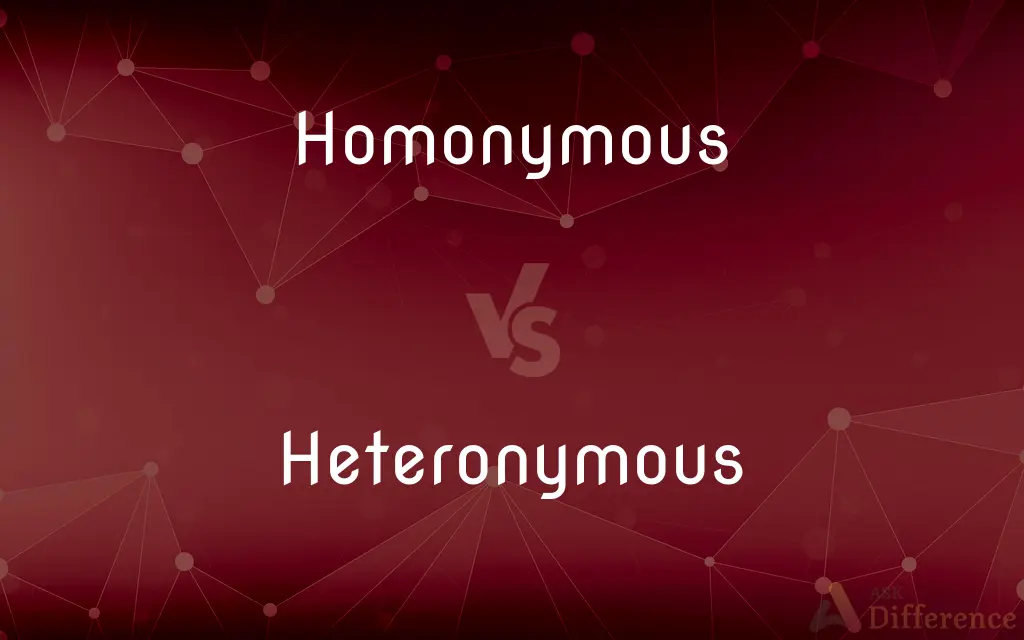Homonymous vs. Heteronymous — What's the Difference?
By Maham Liaqat & Fiza Rafique — Updated on May 9, 2024
Homonymous terms share the same spelling or pronunciation but have different meanings, whereas heteronymous terms are different words that refer to the same concept in various languages or systems.

Difference Between Homonymous and Heteronymous
Table of Contents
ADVERTISEMENT
Key Differences
Homonymous terms have identical spelling or sound, leading to ambiguity based on context. For example, "bat" can mean a flying mammal or sports equipment. On the other hand, heteronymous terms describe different words in various languages that represent the same concept, such as "apple" in English and "pomme" in French.
Homonymous words are a common source of wordplay in jokes or puns because of their identical appearance or pronunciation. Meanwhile, heteronymous terms offer linguistic insight into how different cultures describe the same ideas or objects.
Homonymous words often cause confusion when reading or listening, requiring context to differentiate meanings. In contrast, heteronymous terms are typically encountered in translation, dictionaries, or comparative linguistics.
Homonymy encompasses both homographs (same spelling) and homophones (same pronunciation), complicating language learning for non-native speakers. Heteronymy emphasizes differences across languages or naming systems.
Comparison Chart
Definition
Same spelling or pronunciation, different meanings
Different words representing the same concept
ADVERTISEMENT
Example
"Bat" (mammal vs. sports equipment)
"Apple" (English) vs. "Pomme" (French)
Ambiguity
High, requiring contextual clues
Low, mainly used across languages
Wordplay
Frequently used in jokes or puns
Rarely utilized for wordplay
Encountered in
Everyday conversation or reading
Comparative linguistics or translation
Compare with Definitions
Homonymous
Having the same spelling but different meanings.
The word 'lead' is homonymous as it can mean both a metal and to guide.
Heteronymous
Terms or names that differ in various systems.
Metric and imperial units are heteronymous ways to measure.
Homonymous
Terms that can cause lexical ambiguity.
Editors carefully avoid homonymous terms to ensure clarity.
Heteronymous
Describing words that have the same meaning but different forms.
The words 'perro' and 'chien' are heteronymous for 'dog' in Spanish and French.
Homonymous
Phonetically similar words with different meanings.
The homonymous terms 'their' and 'there' often cause confusion.
Heteronymous
Having differing linguistic origins yet describing similar concepts.
Heteronymous expressions reflect cultural naming conventions.
Homonymous
Related to ambiguity due to identical forms.
In context, it's clear which homonymous term is meant.
Heteronymous
Used in comparative linguistics to identify word differences.
The dictionary includes a list of heteronymous terms across languages.
Homonymous
Both homophones and homographs.
Homonymous words are a challenge for ESL learners.
Heteronymous
Different forms signifying the same meaning or concept.
Translations often include heteronymous examples to aid understanding.
Homonymous
Having the same name.
Heteronymous
Being, relating to, or of the nature of a heteronym.
Homonymous
Of the nature of a homonym; homonymic.
Heteronymous
Being different names or terms but having correspondence or interrelationship, as mother and daughter.
Homonymous
Having the same name as another (i.e., like a namesake).
Heteronymous
Of, or relating to a heteronym.
Homonymous
Of or pertaining to a homonym.
Heteronymous
Being different words, but having a common relationship, as in the case of brother and sister, which denote siblings.
Homonymous
(ophthalmology) Homonymous hemianopsia (blindness in the same side of both eyes)
Heteronymous
(ophthalmology) Heteronymous hemianopsia (blindness in the left side of one eye and the right side of the other eye)
Homonymous
Having the same name or designation; standing in the same relation; - opposed to heteronymous.
Heteronymous
Having different names or designations; standing in opposite relations.
Homonymous
Having the same name or designation, but different meaning or relation; hence, equivocal; ambiguous.
Common Curiosities
Do homonymous words create confusion in writing?
Yes, they can cause ambiguity without context.
Are homonymous and heteronymous words the same?
No, homonymous words share spelling or pronunciation, while heteronymous words differ but have the same meaning.
Can homonymous words have more than two meanings?
Yes, some words like "set" have multiple meanings.
Do homonymous words include homographs and homophones?
Yes, both fall under the umbrella of homonymy.
Are heteronymous terms fixed across all languages?
No, different languages can have unique words for the same concept.
Are heteronymous terms specific to language learning?
Primarily, but they are also relevant in translation and linguistics.
Do homonymous words exist in all languages?
Yes, most languages contain words with multiple meanings.
Can homonymous words be easily identified?
Often, but sometimes context is needed to distinguish meanings.
Can heteronymous terms have cultural significance?
Yes, they reflect how different languages perceive and name concepts.
Do heteronymous terms include technical jargon?
Yes, scientific and specialized fields have heteronymous terms.
Are homonymous words always confusing?
Not always; context usually helps clarify the meaning.
Can homonymous words change meaning over time?
Yes, meanings can evolve, further complicating interpretation.
Is there a relationship between homonymy and puns?
Yes, puns often rely on homonymous words for humor.
Are heteronymous terms consistent across dialects?
Not always; dialects sometimes use different terms for the same concept.
Do heteronymous terms affect translation quality?
Yes, recognizing them improves the accuracy of translations.
Share Your Discovery

Previous Comparison
Brasswind vs. Woodwind
Next Comparison
Intestine vs. GutAuthor Spotlight
Written by
Maham LiaqatCo-written by
Fiza RafiqueFiza Rafique is a skilled content writer at AskDifference.com, where she meticulously refines and enhances written pieces. Drawing from her vast editorial expertise, Fiza ensures clarity, accuracy, and precision in every article. Passionate about language, she continually seeks to elevate the quality of content for readers worldwide.













































